Zero-M

Zer0-M aimed at concepts and technologies to achieve optimised close-loop usage of all water flows in small municipalities or settlements (e.g. tourism facilities) not connected to a central wastewater treatment - the Zero Outflow Municipality (Zer0-M). The beneficiary countries are Egypt, Morocco, Tunisia and Turkey. The following activities were developed:
Set-up of an Internet network for experts on the above described topics; building up links to existing websites; organisation of regional and international conferences, publication of a journal. (Know-how exchange)
Training and workshops in Training and Demonstration Centres (TDC) in four MEDA-Partner countries addressing different target groups; excursions for experts to existing SWM examples in EU countries; up-dating of relevant legislation in order to discuss SWM friendly regulations.
Realisation of Zer0-M installations attached to four TDCs (components: water saving household and sanitary appliances, biological grey water treatment, membrane bioreactors, constructed wetlands); monitoring; pilot implementations for a site in Egypt, a Tunisian rural settlement and a development site in Morocco. (Technology transfer).
Case studies on four small municipalities or settlements in the 4 MPCs with the elaboration of Zer0-M concepts, developing cartographic visualisation and representation tools, a software tool for modelling economic effects and a life cycle assessment of environment and health aspects of SWM components.
A CD-ROM containing a video and information about SWM for different target groups.
The project cost € 5,516,569.00, of which 80% was funded by the European Community.
IRIDRA worked on Zer0-M as subcontractor of the ONLUS "Ambiente e Lavoro Toscana" and to design and work supervision of pilot plants in Tunisia and Egypt.
IRIDRA was involved in the Zer0-M project as a subcontractor of the Ambiente e Lavoro Toscana Onlus; the consultancy regarded technical assistance on the design and monitoring of four Technological Demonstrative Centres (TDCs) sited in 4 countries (Morocco, Tunisia, Egypt and Turkey) and of 2 demonstrative full-scale systems in Tunisia and Egypt. Moreover, IRIDRA has also participated in the development of the Zero-M website, done courses in the WP2, participated in the elaboration of the conceptual model and of the DSS software in WP4. Finally, IRIDRA has also disseminated the project results to international conferences and publishing in peer-review journals.
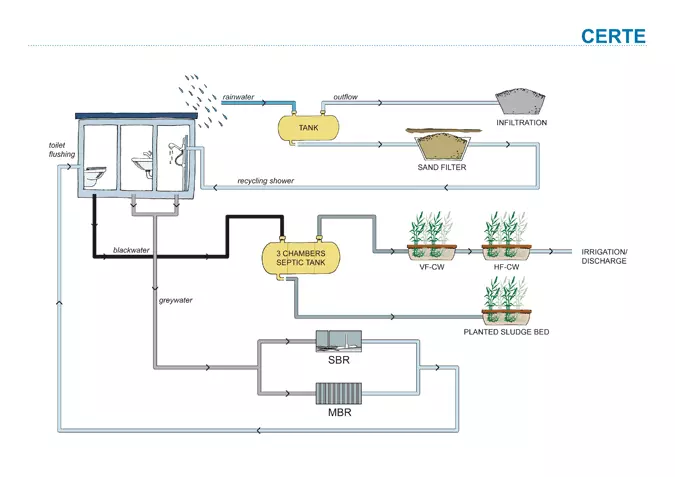
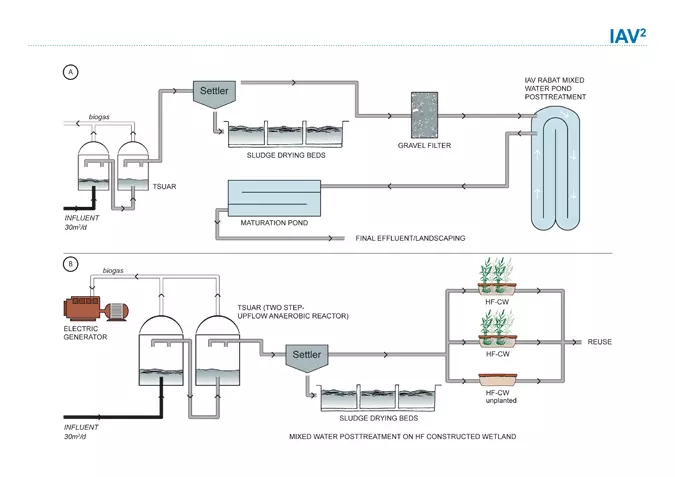
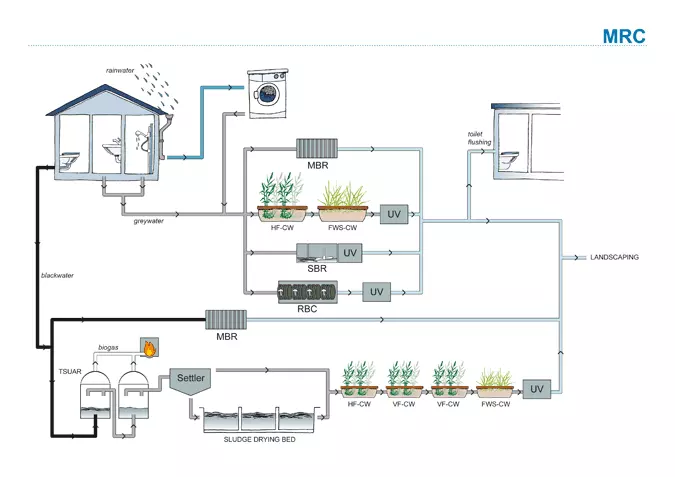
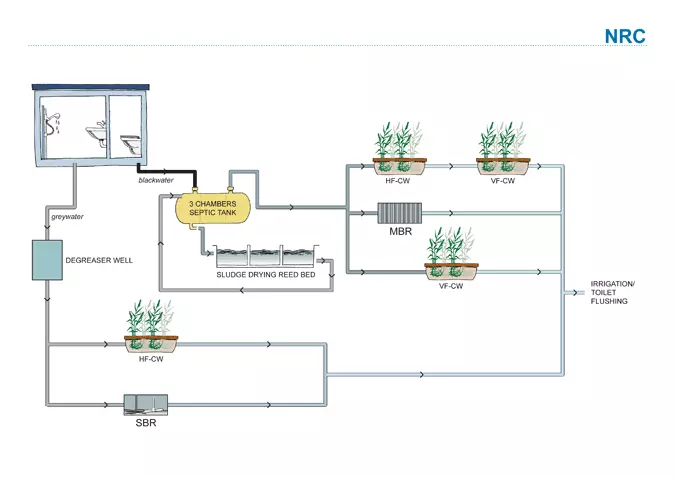
Case study - Chorfech (Tunisia)
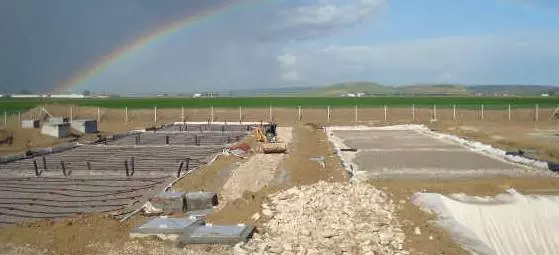
Constructed wetland for treatment of urban wastewater of Chorfech village (Tunisia)
Case Study - Sekem (Egypt)
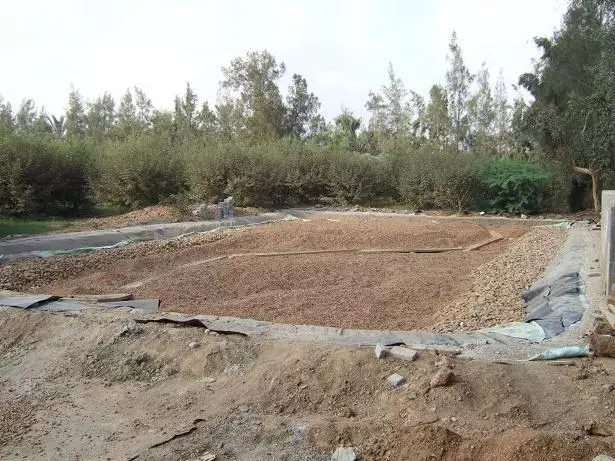
Constructed wetland for Sekem village (Egypt)
IRIDRA's publications in the Zero-m project
IRIDRA's authors are highlighted in bold.
- Masi F. and Martinuzzi N., “Constructed Wetlands for the Mediterranean countries: hybrid systems for water reuse and sustainable sanitation”, Desalination, Vol. 215, pp. 44-55, 2007.
- Masi F. and Martinuzzi N., “Constructed Wetlands for the Mediterranean countries: proposal of a hybrid system’s optimised design for water reuse and sustainable sanitation”, in Sustainable Water Management, journal of the EU project “Sustainable Concepts towards a Zero Outflow Municipality” (Zer0-M), n 1, pp. 14-18, 2007.
- Masi F., “Constructed wetlands for decentralized wastewater treatment”. Water, Waste and Environmental Research, Vol. 7, N°1-2, pp: 25-38, 2007.
- Masi F., Conte G., Martinuzzi N., “Sustainable Sanitation by Constructed Wetlands in the Mediterranean countries: experiences in small/medium size communities and tourism facilities”, in “Efficient Management of Wastewater, Its Treatment and Reuse in Water Scarce Countries”, Al Baz, Ismail; Otterpohl, Ralf; Wendland, Claudia (Eds.), Springer, NY, ISBN: 978-3-540-74491-7, pp. 125-138, 2008.
- Masi F., El Hamouri B., Abdel Shafi H., Baban A., Ghrabi A., Regelsberger M., “Outline of constructed wetlands in Zer0-m”, in Sustainable Water Management, journal of the EU project “Sustainable Concepts towards a Zero Outflow Municipality” (Zer0-M), n 2/2008, pp. 36-39, 2008.
- Sheumann R., Masi F., El Hamouri B., Kraume M., “Greywater treatment as an option for effective wastewater management”, in Sustainable Water Management, journal of the EU project “Sustainable Concepts towards a Zero Outflow Municipality” (Zer0-M), n 2/2008, pp. 11-15, 2008.
- Hussein I. Abdel-Shafy, Martin Regelsberger, Fabio Masi, Christian Platzer and Mohamed A. El-khateeb, “Constructed Wetland in Egypt”, in Sustainable Water Management, journal of the EU project “Sustainable Concepts towards a Zero Outflow Municipality” (Zer0-M), n 3/2008, pp. 10-14, 2008.
- Masi F., “Water reuse and resources recovery: the role of Constructed Wetlands in the Ecosan approach”, Desalination, Vol. 246, pp. 27-34, 2009.
- Scheumann R., Masi F., El Hamouri B., Kraume M., “Greywater treatment as an option for effective wastewater management in small communities”, Desalination and Water Treatment, 4, 33–39, 2009.
- Masi F., El Hamouri B., Abdel Shafi H., Baban A., Ghrabi A., Regelsberger M. “Segregated black/grey domestic wastewater treatment by Constructed Wetlands in the Mediterranean basin: the Zer0-m experience”, Water Science & Technology, 61, 1, 97-105, 2010. doi:10.2166/wst.2010.780.
- Ghrabi A., Bousselmi L., Masi F., Regelsberger M., “Constructed wetland as a low cost and sustainable solution for wastewater treatment adapted to rural settlements: the Chorfech wastewater treatment pilot plant”, Water Science & Technology, 63, 12, 3006-3012, 2011.
- Ben Saad M., Bousselmi L., Masi F., Ghrabi A., A new approach for local waste water management sanitation case study of rural school (Chorfech 24), Water Practice & Technology; 10(3):474. DOI:10.2166/wpt.2015.054, 08/2015.

